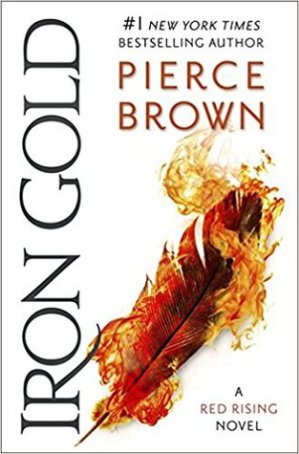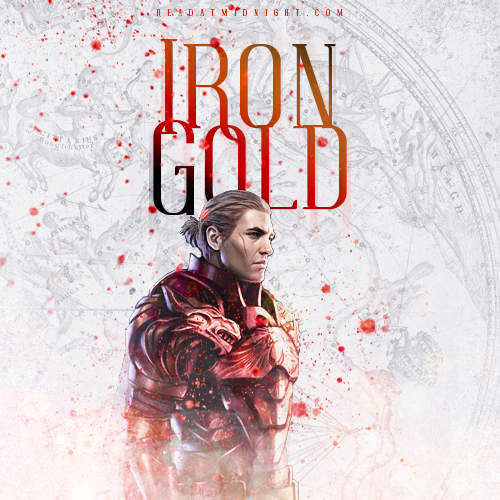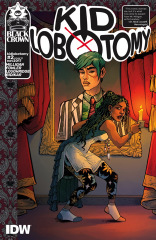

Title: Iron Gold
Author: Pierce Brown
Rating: 5/5 Stars
Series? Yes
Goodreads
Book Depository // Dymocks // Booktopia
Disclaimer: I received a copy of this book from Hachette Australia, all opinions are mine.
Note: This review will contain spoilers for the first Red Rising trilogy (including spoilers of the last book, Morning Star). I promise it will be absolutely spoiler-free for Iron Gold itself! If you haven’t read the previous trilogy, what are you waiting for?! Go binge it immediately, it will be one of the best decisions you’ll make this year.
 Darrow Character Art by Magali Villeneuve
Darrow Character Art by Magali Villeneuve
I can say with absolute certainty that the Red Rising trilogy is one of the best series I’ve ever read, and it’s one I regularly recommend to avid bookworms and reluctant readers alike. Aside from its gripping action and high-octane emotional drama, the series is populated by some of my fictional favourites. While I found Morning Star a wholly satisfying conclusion, I was pumped to discover Pierce Brown wanted to expand on the series. We’ve seen numerous fictional tyrannical empire fall before visionary young leaders, yet we rarely witness the aftermath of these upheavals. Iron Gold explores the conflict and unrest which continues to plague the newfound Republic a decade after its establishment.
“War eats the victors last.”
If the first trilogy is an examination of revolutions and wars, this sequel trilogy scrutinizes the slippery slope of governance and politics. In classic Red Rising manner, Iron Gold never deals in moral absolutes. The readers are shown numerous sides of every political debate, and I can appreciate the hefty weight that Mustang carries on her shoulders as the Sovereign of the new Republic. Similarly, Darrow faces a multitude of challenges as he’s simultaneously the ArchImperator of the Republic, and a living symbol of The Rising. Our heroes’s exploits during the The Rising have been made into legend in the decade that followed the fall of society, but we will soon find out that being living gods is a tough act when the fate of the Solar System hinges on your every decision.
Alongside with the challenges of governance, we also see Darrow grapple with being a father and a husband. One of Darrow’s most enduring trait throughout the series is his inability to choose, whether it’s he’s torn between his identity as someone who’s both Red and Gold – or picking between his duties to the Republic and his responsibilities to Mustang and his son, Pax. We also see several other characters struggle with the fine balancing act that comes with a family, most delightful of all being the Barca – Sevro and Victra both retains the essence of their character, honed all the sharper in their roles as parents.
On the flipside to the Republic, the book also follows Lysander and Cassius as they travel to the Rim of the system. The Rim is somewhere I’ve always wanted the first trilogy to explore in more details, so I felt gratified to see it in sharp focus during Lysander’s chapters. The culture of the Rim is derivative of Japanese traditions, in particular the honour codes of the samurai. I have to admit, I was a bit nervous to see the world building head towards this direction –thankfully the influences avoided cultural misappropriation by featuring more than stereotypes and aesthetics. Numerous new personalities emerge from the Rim, with my favourites being the two mother-daughter duo of Dido and Seraphina.
Another reason why I found Lysander’s chapter engaging was the philosophy by which he lived, as they are drastically different from my own. Although I don’t agree with his point of view, at times they infuriated me, I could always understand where he was coming from. I can’t wait to see where future books will take his character and his choices. A mirror to his own story arc, Lysander’s relationship with Cassius is fraught with contradiction and tension. Their brotherhood is tainted by mistrust and Cassius’s betrayal of the Golds ten years ago, yet strengthened by the time they spent in exile together. This series has such a knack for layered friendships and this one quickly became one of my favourites.
Two new voices are added in this series, and they both add another dimension of depth to the world of Red Rising. The first is Lyria of Lagalos, a Red been liberated from the mines – but finds herself shackled by poverty and prejudice that still plagues this new world. Her narration is filled with resentment towards Darrow and Mustang, along with the unfulfilled promises of the Republic. I loved her chapters, especially for the way Iron Gold incisively criticises the ongoing social injustices of the real world through it. The other point of view is Ephraim ti Horn, a Gray who once served in The Rising, but walked away once bloodshed and tragedies turned him cynical. Through his eyes, we see the underbelly of society, where gangsters and thieves are caught in an interplanetary web of crime and deceits. Ephraim is also the first main character in Red Rising to openly identify as gay, and I’m glad to see a step towards more inclusivity in this series.
The world building is expanded immensely in this book, yet it never gets in the way of the constant thrum of action. There are machinations from all sides, open-war and heart-stopping combat, betrayals and triumph, and underlying all of that – a deeply personal narrative about how difficult it is to remain a hero in a broken world. But they bloodydamn try, and I love them all for it.
As I said to CJ on twitter earlier on today, it’s not a Red Rising book unless you feel your very existence is being threatened while reading it. Iron Gold certainly fits that bill, so Howlers: brace yourselves and pray for your faves.
Please tell me whether you’ve read this series, and let me know your thoughts. However: No spoilers for Iron Gold in the comments please, or The Reaper himself will come for you with his slingBlade.
I also posted some phone wallpapers based on the book earlier on this week, check them out here!
Share this:




